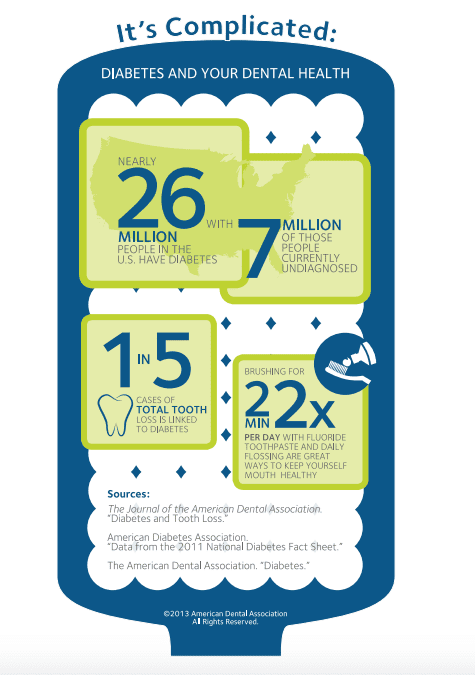According to the American Diabetes Association, 9.3% of the American population has diabetes. Of that number, nearly 28% are undiagnosed. In addition, 1.4 million American are newly diagnosed each year and the number of pre-diabetes patients is rising drastically. If you have, or are at risk for, diabetes, being mindful of your oral health is especially important.
Diabetes is a chronic, metabolic disease that affects the body’s production of insulin, the hormone that regulates glucose (sugar) levels in the blood. In Type 1 diabetes, formerly known as juvenile diabetes, the pancreas does not produce any or enough insulin. In Type 2 diabetes, the body does not process insulin properly. Too little insulin causes elevated blood sugar levels. Careful monitoring of insulin levels is paramount for diabetic patients to maintain all aspects of their health.
In diabetic patients, overlooking oral health can have significant consequences. High blood sugar contributes to bacterial growth. In diabetic patients, the ability to fight bacteria may be impaired. Bacteria contributes to gum disease and other oral health problems, including infection. Infections cause blood sugar to rise and diabetes may become harder to control, spiraling into a dangerous cycle.
Diabetic patients are at greater risk for gum disease, which, according to the American Dental Association, affects nearly 22% of diabetics. There’s also an increased risk of oral infections, dry mouth, tooth loss, and fungal infections.
Signs to look for that may indicate an oral health problem include: swollen or bleeding gums, chronic mouth pain, problems tasting food, tooth sensitivity, white or red patches anywhere in the mouth, or dark spots on your teeth. If you are diabetic or pre-diabetic and you notice any of these warning signs, contact your dentist right away for an appointment.

The typical steps of maintaining a healthy mouth, such as brushing and flossing correctly twice a day, regular dental checkups, avoiding smoking, and checking your mouth for signs of problems, are especially important for diabetic patients. These steps should be combined with the standard maintenance of diabetes such as controlling your blood sugar levels, maintaining a healthy diet, and taking prescribed medications. Additional steps include, keeping your informed about your diabetes and any other health concerns, drinking plenty of fluids to keep your mouth less hospitable to bacteria, and, if you wear dentures, to remove them at night and keep them clean.
Oral health plays a vital part in your overall physical health, but this is particularly true if you are diabetic or at risk for diabetes. Contact Dr. Scott Finlay and Associates, DDS at 443-276-4094 to make an appointment if you have any oral health concerns.
